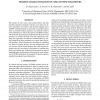Free Online Productivity Tools
i2Speak
i2Symbol
i2OCR
iTex2Img
iWeb2Print
iWeb2Shot
i2Type
iPdf2Split
iPdf2Merge
i2Bopomofo
i2Arabic
i2Style
i2Image
i2PDF
iLatex2Rtf
Sci2ools
153
click to vote
EJASP
2010
2010
Sparsity-Aware Estimation of CDMA System Parameters
The number of active users, their timing offsets, and their (possibly dispersive) channels with the access point are decisive parameters for wireless code division multiple access (CDMA). Estimating them as accurately as possible using as short as possible training sequences can markedly improve error performance as well as the capacity of CDMA systems. The fresh look advocated here permeates benefits from recent advances in variable selection (VS) and compressive sampling (CS) approaches to multiuser communications by casting estimation of these parameters as a sparse linear regression problem. Novel estimators are developed by exploiting two forms of sparsity present: the first emerging from user (in) activity, and the second because the actual nonzero parameters are very few relative to the number of candidate user delays and channel taps. Simulations demonstrate an order of magnitude gains in performance when sparsity-aware estimators of CDMA parameters are compared to sparsity-ag...
Related Content
| Added | 17 May 2011 |
| Updated | 17 May 2011 |
| Type | Journal |
| Year | 2010 |
| Where | EJASP |
| Authors | Daniele Angelosante, Emanuele Grossi, Georgios B. Giannakis, Marco Lops |
Comments (0)

